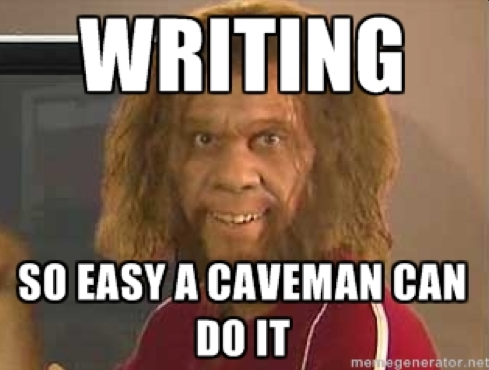
Image courtesy of Jules Morgan via Flickr Creative Commons
Yes today is odd. Posting on a Sunday. We are headed into Spring Break and yeah…hard to maintain my usual schedule. Today we’re going to dive deeper into deep POV and then, later in the week, I am going to bring you guys an expert on deep POV 😉 .
Will be fun.
To accomplish “deep POV” yes, there are style changes we can make, like removing as many tags as we can and ditching extraneous sensing and thinking words. But deep POV is more than just tight writing, it’s also strongly tethered to characterization. Good characterization.
It is essential to know our cast if we hope to successfully write “deep POV.”
KNOW Your Cast
There are all kinds of ways to get to know our characters. I often write detailed character backgrounds before starting a story so it doesn’t become a fish head.
Why we need to know our characters is that deep POV is a reflection of the inner self, how that character sees the world, responds, evades, processes, etc. It is also a reflection of personal history and relationship dynamics.
*cue brain cramp* *hands paper bag*
It’s okay. Breathe. We’re going to unpack this.
Reflection of the Character
Back when I used to run a weekly workshop, I had writers do a little exercise to help them learn POV and also strengthen character-building skills. I gave this scenario:
We have a family of four—Mom, Dad, a grandparent (either gender) and a teen (either gender) who has spent a year saving for a family vacation. On the way to their destination, the vehicle breaks down. What happens and tell it from the perspective of EACH family member.
Every week, writers showed with the perspective of one of the four. We had ASTONISHING creativity.
Who These Characters ARE Changes the Story AND Deep POV
When we layer in some background, the characters (and consequently the story, problems and conflict) all change drastically.
What if dad is finally home from his forth tour in Afghanistan and has terrible PTSD?
What if Mom is a closet alcoholic?
What if the teen is recently in remission from Leukemia?
What if Grandma is a tireless flirt who’s antics got her turned into a vampire and the family can’t understand why Granny wants to travel only at night?
What if the teen is an asthmatic and forgot his inhaler?
What if Granddad has early on-set Alzheimer’s?
What if the teen has been recruited for a mandatory deep space mission by the New Earth government and will never see the family again?
What if the teen was adopted and the purpose for the trip was to meet the child’s birth mother? How would this impact the emotions of those in the vehicle?
What if there used to be TWO children and one had died in an accident a year previously?
Do you see how by changing WHO these people are, this cannot HELP but affect everything else?
If Dad has PTSD, he might jump at every lump of roadkill because that’s how insurgents hide IEDs. If the family is stranded and Mom can’t get to a liquor stash, she might start getting belligerent or, left too long, start going through DTs. What would an addict notice? Likely nothing beyond how to get a fix.
While a kid in remission with a new lease on life might enjoy being broken down in the middle of nowhere (appreciating the little things in life) the addict would be hysterical.
All of this will impact Deep POV because we are in the HEAD and EMOTIONS of the character.
Let’s pick on Mom for an illustration. I’m riffing this, so the writing is just an illustration. Just roll with it.
Kidding! Lighten up. You seem tense.
Example One:
Fifi clutched the baby picture, the one she’d carried everywhere for fifteen years. She hated she was happy the old van had finally given out. Her husband stared, bewildered at the smoking engine. Other than car trouble, he seemed fine. Fine. How can he be fine?
She glanced back at her daughter, the living reflection her of all her dreams and failures. She’d wanted a baby more than life. Every night on a freezing floor. One miscarriage after another and then came a tiny bundle of everything she’d ever longed for.
That woman hadn’t wanted her. That woman had abandoned her. That woman was Gretchen’s real mother and now Gretchen wanted to meet her. Real mother, like hell. And I’m a real astronaut.
How had she failed? If she’d been a good mother, Gretchen would have forgotten that woman and they wouldn’t be here.
“You okay?” Her daughter bent between the seats and kissed her cheek. “You said this was okay, that we could do this. You’re sure, right?” A wary smile revealed new braces, the braces Fifi paid for with money she’d saved for a new van.
“I’m fine, Honey.” She crumpled the baby picture and opened the van door. She needed air.
***
Example Two:
Fifi clutched the baby picture, the one her daughter had given her a week ago for Mother’s Day when they picked her up from rehab. Ninety days clean. At least that was the lie she’d packed along with her swimsuit and the hairspray can with the secret compartment and the only pills they hadn’t found.
The pills that were now gone.
They should have already been at the resort, the one staffed with eager friends willing to help her out. Friends with first names only who took cash and asked no questions.
Fifi scratched at her arms. Millions of insects boiled beneath her skin, invaded her nerve endings and chewed them to bleeding bits. Pain like lightning struck her spine, the section crushed then reconstructed. Pain like lightning spidered her brain, frying her thoughts. She glanced again at the baby picture, then at the fine young woman in back. Her daughter Gretchen.
What am I doing?
Maybe she would be okay. Maybe she hadn’t had enough pills to completely undo her. Maybe she could ride this out. And maybe I’m the Queen of England.
Gretchen bent between the seats and kissed her on the cheek. “I love you, Mom. You okay?”
Tears clotted her throat. She nodded. “Yes, I’m fine, Honey.”
“You mean it?”
She hesitated then smiled. “Yes. Yes I do.”
She tucked the baby picture in her shirt pocket, close to her heart and opened the van door. She needed air. She also needed to change their plans. Visit somewhere with no friends. With no one who took cash.
Do you see how changing WHO Fifi is changes everything? Everything she is sensing, feeling, thinking. Being in the emotions of a heartbroken mother who feels betrayed is a very different experience from being in the head of a sympathetic addict who’s struggling to get clean and stay clean.
***
Both women are impacted by the daughter. One Fifi is hurt by the daughter, the other Fifi finds hope in the daughter. Both women are conflicted. One is tormented with feelings of failure and betrayal and the other is tormented by failure, but very real physical problems of addiction that impact the story.
Deep POV has thrust us into the head and emotions of both women. We feel what they feel. The author is invisible because there are no tags. The sensations are raw and visceral because we have gotten rid of the coaching words.
Instead of:
Fifi felt millions of insects boiling beneath her skin….
We get right to it.
Millions of insects boiled beneath her skin…
The sensation is CLOSER. There is no psychic distance. She isn’t thinking she is going to lose it. She isn’t wondering if she can keep it together. She is experiencing everything real-time and up-close.
Instead of:
Fifi thought, What am I doing?
She just does. We KNOW Fifi is thinking because we are camped in her head.
Deep POV is Akin To Method Acting

Couldn’t resist. I LOVE “Tropic Thunder”!
When we know our characters, who they are, how they came to be, the formative experiences, what they want from life, etc. we can then crawl in that skin and become that person. By us becoming that character, we then have the power to transport our reader into the skins we have fashioned.
I hope this helps you guys understand the magical, mystical deep POV and now you’re all excited about writing stronger characters. What are your thoughts?
Before we go, I want to give you a heads up especially if you are thinking on attending a conference.
I’m holding my ever-popular Your Story in a Sentence class. Can you tell what your book is about in ONE sentence? If you can’t? There might be a huge plot problem. This also helps if you are ever going to query or pitch an agent. The first ten signups get their log-line shredded by MOI for FREE.
Also speaking of FREE, I’d like to mention again the new class I am offering!
How and WHY are we using FREE!?
Making Money with FREE! As a bonus for this class, my friend Jack Patterson who’s so far sold over 150,000 books to come and teach us how to ROCK the newsletter. This is in excess of two hours of training and the recording (as always) comes with purchase.
I LOVE hearing from you!
To prove it and show my love, for the month of MARCH, everyone who leaves a comment I will put your name in a hat. If you comment and link back to my blog on your blog, you get your name in the hat twice. What do you win? The unvarnished truth from yours truly. I will pick a winner once a month and it will be a critique of the first 20 pages of your novel.










21 comments
6 pings
Skip to comment form
Suzanne Brockmann does Deep POV really well. But who else? I love learning by reading great writing.
And I thought I liked Introducing Deep POV- WTH IS It a bunch, lets just say you went a lot deeper the second time around (which I’m thankful for). I liken POV 2 with the old term, ‘just trim the fat and get to the meat of the matter’. And that’s exactly what Kristen did in showing how to do away with the unnecessary clutter authors subject their readers to. One way a deeper POV is reached when an author can lose themselves in the conflict, the angst if you will, in the character. Give readers their plight firsthand and it’s kinda hard not to achieve deep POV. Just remember to filter the filler words, find the your character’s flaw and embody it, your readers will thank you for it.
I have been dropping tags like a shoplifter at Macy’s thanks to your last POV post. I was amazed at how many tags I could drop. I love getting inside of my characters head, sometimes we argue about what should be done in a scene that’s when I know to let go and let the character just be themselves.
And the great thing about letting your characters just ‘be’ is they become just that more authentic and relatable. When I sit down to write I put myself in the mindset of the patients are running the asylum and I’m just recording it all.
And they are definitely not me or like anyone I actually know. Its as though I am a medium and my books are the seance.
lol…true indeed.
Reading your blog beats the Sunday Paper any day! Now to go hit some balls down the fairway!
Author
Awww thank you ((HUGS)).
I think I missed your last POV post, but this one is great. I stopped reading RISE OF THE MACHINES to read my email, and found more good advice. Thanks for being there, Kristen!
Author
You are most welcome! 😀
Thanks again for really helpful advice 🙂
I recently had a problem with not writing deep enough. I knew my characters very well but it wasn’t being reflected in the writing. My solution: changing tenses–from past to present.
I have reverted to the present tense too and then in rewrites going back to past. not only deeper POV, but makes the writing so much easier.
Reblogged this on ugiridharaprasad.
Hello Kristen! Happy to lend my two shillings. I am a huge advocate of deep POV ever since the concept was introduced to me.
I can add this to help writers,especially fantasy/sci-fi writers:
Many of you have wasted countless hours playing computer games. My sin is World of Warcraft. Deep POV is moving the mouse wheel forward until you are looking through the eyes of the character. You may play the game with the mouse-wheel back a bit so you can see your character in action, but you EXPERIENCE the game in full first-person view. When you step into a new area of the game and see that ancient palace clinging to the side of a mountain,dragons circling overhead and a faded moon rising over the horizon–and your finger reaches for the screen-shot button.
That’s deep POV. How did YOU feel?
Deep POV seeks to eliminate, with extreme prejudice, the voice of the narrator. Yes, you will need some narration, but it should be as invisible as “said”–which you should also use as little as possible. (Also, put on your dark sunglasses to hide your cybernetic implants, lock and load your double-shotgun and kill all “he shouted, he barked, he exclaimed, he explained, he whispered (yes, that one too! BOOM! Both barrels) he griped, he demanded, he–you know, just fucking kill them all.) Said. Asked. Replied. Answered. They are the cockroaches to survive the Armageddon. The rest die.
If you read Kristen’s blog, I’m preaching to the choir with that.
Last point. Deep POV is uniting the best of 1st person (which sucks. Never write in that. Yes, I just lost half of you right there. Blow me. I don’t care. Don’t do it. Ever.) –the best of 1st person and 3rd person, single POV. You can have a truck driver’s thoughts and be poetic.
The road was a pale ribbon in the moonlight. Babba scratched his balls and punched off the radio. Fucking wetback music. That’s all they play here. He slowed the eighteen wheeler, a rhinoceros among foreign sheep, and took the unmarked off-ramp.The message said to be at the rendezvous at a quarter-past midnight. He had never been late for a delivery and tonight–especially–would be no exception. He patted the cool steel of the .45 on the passenger seat, waiting for his fist like a pit bull straining at its leash. He grinned. Tonight was gonna be a good night.
I was bored the other day and went back to the beginning of your blog. I was struck by the difference in how you started and where you were when I found my way here. I only read the first two months but they were all about writing. I see a lot of value in your advice on platform and brand but your advice on the craft is more interesting to me and, I believe, more helpful to new writers.
Reblogged this on writersback and commented:
Deep POV Part Two by Kristen Lamb. Awesome post how to eliminate psychic distance and write in real-time.
Reblogged this on Writer's Treasure Chest and commented:
In this informative and useful blog post Kristen Lamb gets further into the POV. It’s part two of her lesson. I don’t think we want to miss this.
Reblogged this on Flynn Gray and commented:
Kristen Lamb brings us more tips on Deep POV, how to achieve it, and why it improves your writing. ~ Flynn
Love learning about POV, love the comments. Will return to this blog. Thanks Kristen.
Reblogged this on American Writers Exposed and commented:
Love this lady!
[…] Source: Getting in Character—Deep POV Part Two […]
[…] Source: Getting in Character—Deep POV Part Two […]
[…] Source: Getting in Character—Deep POV Part Two […]
[…] those struggling to create compelling characters, Kristen Lamb discusses getting into character — deep POV, part two and Dave King gives some tips for getting into other people’s heads. To help you with your […]
[…] can you not love Kristen Lamb, she wears a viking helmet! On her blog, she write a humorous but well thought out post on […]
[…] Deep POV—WTH IS It? Can We Buy Some on Amazon? / Getting in Character—Deep POV Part Two / Want a Page-Turner? You Need Deep POV – links to three posts re Kristen Lamb’s advice on […]